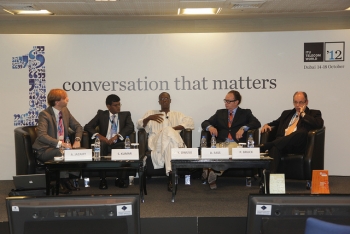Enough Is Enough: Sustainability Ideas Across Cultures And Time

Sufficiency, not surfeit. Small is beautiful. Less is more. Of course we use these phrases. We throw them around with as little economy as we practise in other aspects of our lives. Fact is, we cannot expect to live double lives for much longer and sustain the earth in a way that future generations can enjoy and benefit from it. This is why ecological economists believe that factoring in human and environmental stances into economics is the only way forward.
EF Schumacher and Herman Daly are two prominent ecological or ‘humanist’ economists. While earlier, human beings were mere cogs in the machine of Economics and market forces, these two thinkers place us in the heart of this matter. This is not to say that human beings have first rights to this planet as a lot of us wrongly assume in aspects of everyday living. Rather, it suggests that, as primary users (and, historically, abusers) of the Earth and its many gifts, we are irrevocably at the front seat of the vehicle that will drive the planet either to responsible living or ruin. The idea, thus, is simple: we take only as much as we need to survive; no more.
This kind of thinking is not new. Mahatma Gandhi sought to create local economies based on labour that was self-sufficient and provided basic necessities that were well oriented with the ecosystem. Gandhi, Schumacher and Daly have more in common that this. They all took their inspiration from intangible things. Gandhi’s philosophy was based on a moral ideology, Schumacher’s on Buddhist philosophy and Daly’s, on the concept of sustain happiness as one would a natural resource.
Schumacher wrote, “The ideal is sufficiency, not surfeit. Economic ‘progress’ is good only to the point of sufficiency, beyond that, it is evil, destructive, uneconomic.” Schumacher’s essential doctrine was to move away from industrialization and towards local communities and governments using locally sourced labour and skills. Far from being archaic, out collective failure to sustain the planet through massive corporations and profit-making machinery have made Schumacher’s ideas very relevant in the present. This means putting Man – the culprit – at the centre of taking responsibility and subsequent action, not Man at the centre of the universe, the patriarch of the Earth family.
Schumacher created a philosophy he called Buddhist Economics, the idea being that economics should not be viewed in isolation, but in the context of the larger purpose of life. He maintained that human happiness could not be achieved by the accumulation of wealth or economic growth. His ideology stressed that people were more important than commodities, creative activities more important than consumption and the ultimate goal was the liberation of humankind, not the accumulation of wealth.
He wrote, “When the economy’s expansion encroaches too much on its surrounding ecosystem, we will begin to sacrifice natural capital (such as fish, minerals and fossil fuels) that is worth more than the man-made capital (such as roads, factories and appliances) added by the growth. We will then have
what I call uneconomic growth, producing ‘bads’ faster than goods—making us poorer, not richer.”
